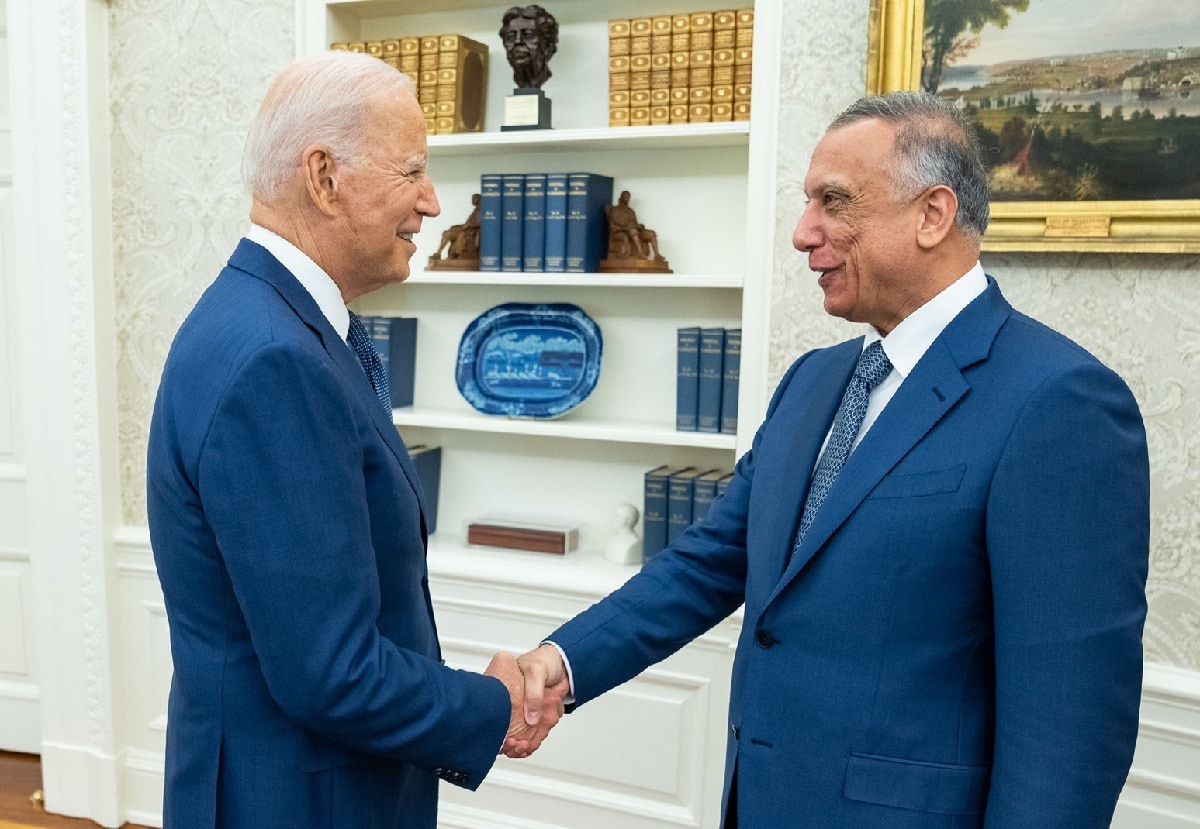Iraqi Prime Minister Mustafa al-Kadhimi will soon return to Baghdad after completing his second trip to Washington as prime minister. Much has changed over the past year, and so has the emphasis of the bilateral relationship. When Kadhimi met Donald Trump last August, Trump declared the fight against the Islamic State over but warned, “If Iran should do anything, we will be there to help the Iraqi people.” Trump praised trade deals, but emphasized the military and oil sectors.
When Kadhimi met Biden on July 26, the president talked about the end of the combat mission, and spoke more about climate change, healthcare, and energy. Climate envoy John Kerry sent representatives to most of the private government meetings to emphasize the importance that the Biden administration attached to climate issues. In his prepared remarks, Biden did not mention Iran. Talk of pivoting to an exclusive train-and-assist mission does little to bolster the confidence of Iraqis that the ultimate goal of Biden’s team is an Afghanistan-style unilateral withdrawal. After all, to many Democrats, the Iraq war was the original sin that continued US military involvement in the country only perpetuates.
While it is false to suggest that a military and non-military relationship are mutually exclusive, Biden is right to emphasize the importance of business ties. Iraq is fertile ground for investment. Many Iraqis resent Iranian dumping of cheap manufactured goods, and seek a higher quality product that American companies can bring.
While the Iraqi delegation hosted a business roundtable and many prominent American companies showed up, it is uncertain if the Biden team and the State Department are prepared to follow through in a way that will be productive for both Iraqis and Americans.
The investment climate in Iraq is not even. Corruption remains rife. Prior to Saddam Hussein’s rise to power, Iraq was the Arab world’s least corrupt state; decades of dictatorship, war, and sanctions made it among the most. In the wake of Saddam’s ouster, many investors flocked to Iraqi Kurdistan only to have those connected to the ruling family swindle them out of billions of dollars. While, in theory, Mosul should be ripe for investment following its devastation in the battle against the Islamic State, bureaucratic paralysis if not corruption leave reconstruction stalled.
Iraq’s second largest city Basra also remains hampered by corruption and dysfunction. Under normal circumstances, the city should thrive. Potentially a jewel of the Gulf, 18 years of dysfunctional post-liberation government (and decades of malicious Baghdad neglect before that) have left its canals little more than open sewers, and its corniche underdeveloped. When pro-Iranian politicians sought to propose Asaad Al Eidani to be prime minister after protestors forced Adil Abdul-Mahdi’s resignation in 2020, Iraqis reacted with outrage because of Al Eidani’s perceived corruption leading President Barham Salih to refuse to sign off on his nomination.
Not every governorate has failed, however. Earlier this spring, I visited Fallujah and Ramadi in Iraq’s al-Anbar governor. The two cities were once among Iraq’s most dangerous. Today, they are among the most prosperous. Iraqis across the ethnic, sectarian, and political spectrum credit both Muhammad al-Halbousi, the current speaker of the parliament and a former governor of al-Anbar, and current governor Ali Farhan al-Dulaimi. Halbousi never forgot his roots and often seeks to use his political influence to channel money into his home province. Iraqis look at Dulaimi, meanwhile, with awe simply because his scrambles to win projects never cease. Whereas other Iraqi governors sit in large, gaudy offices and expect potential funders to come to them, Iraqis often spot Dulaimi in hotels and offices around Baghdad scrambling to win investment for Ramadi.
Herein lies the key. It can do more harm than good simply to dump money into Iraq as the United States did in the immediate aftermath of the 2003 invasion. To encourage companies to invest in areas like Iraqi Kurdistan that do not take the fight against corruption seriously can also harm long-term bilateral relations. If, instead, the embassy and the International Development Finance Corporation encourage investment only in governorates that show they have the capacity and treat investment as an opportunity rather than an entitlement, then business partnerships can thrive.
Iraq is a democracy, albeit flawed and handicapped by a system in which elites divvy up patronage. If Biden truly wants to help Kadhimi or his successors defeat corruption, then it is important to favor those governorates which work and demonstrate through actions, not just words, that dysfunctional, incompetent, or corrupt regions will be left behind until, like al-Anbar, they get their own act in order.
Michael Rubin is a senior fellow at the American Enterprise Institute and a 1945 Contributing Editor.

